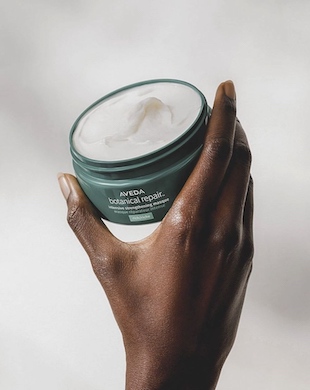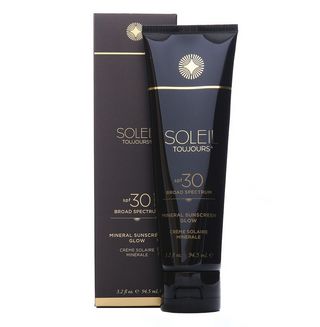Mineral Sunscreens
Mineral or physical sunscreens are mainly made up of fine particles, and, would you believe, mineral compounds, like zinc oxide and titanium dioxide. These physical barriers are broad spectrum, which means they protect from both UVA and UVB rays.
Like mineral foundations, mineral sunscreens sit on the top layer of the skin, acting as a mirror to the rays of the sun, meaning no penetration will usually occur into the skin.
Our resident Dermal Therapist James Vivian recommends mineral SPF over chemical for the face, as it tends to interfere less with your regular skincare. Vivian continues to explain that due to the shielding factor of mineral SPF, you are able to use your regular AM serums before applying the sunscreen on top.
So, the mineral sunscreens are akin to good quality skincare, typically suggesting you’d save this type of sunscreen for your face.
Unlike chemical sunscreens, mineral works as soon as you apply it to the skin, meaning they’re perfect in a rush (no need to leave it develop before sun exposure).
Mineral SPFs are usually gentler on the skin, but are more prone to creating a white cast (Zinc Oxide remind you of the thick sticky zinc that would sit very opaque in your Dad’s nose back in the day?). Exactly.
Unfortunately, for those suffering from acne and congested skin, mineral SPF can (but not always) be a tad irritating on the skin. Our tip here is to try something a little lighter in texture, and one that is free from fragrance and preservatives (Colorescience is fantastic for this).
Chemical Sunscreens
On the other side of the (broad) spectrum when it comes to sunscreens, we have chemical or organic SPF.
This group of sunscreens contain small filters that absorb UVA & UVB rays which then turn into heat before being expelled from the skin. Unfortunately, this absorption factor means that those who suffer from vascular skin concerns (such as rosacea and broken capillaries) should steer clear of these types of sunscreens wherever the concern is present. This absorption also affects the way in which your skin will react with whatever you have placed on before the SPF. This is the reason why James Vivian suggests forgetting your AM serums if you’re applying a chemical sunscreen in the morning.
In addition to multiple active ingredients found within chemical sunscreens, you’ll typically find antioxidants, such as vitamins C and E. Antioxidants protect the skin from free radicals, as chemical sunscreens have been shown to make skin more prone to free radical damage.
If you’re stuck wondering which sunscreen you already have that may be a chemical sunscreen, we’re betting it’s one of those 50+ bottles you leave in your beach bag. Typically speaking, SPFs of 30+ and more will very likely be chemical sunscreens rather than mineral.
When applying an organic SPF, you’re recommended to apply them for a certain amount of time before exposure to the sun to ensure the adequate amount of absorption occurs to effectively protect the skin
The formulations are usually light in weight, adhere super well to the skin and typically won’t leave much of a white cast. Perfect for a day of reapplication, after a day spent in the sun.
Alpha-H Daily Essential Moisturiser SPF50+ 50ml, was $49.95 now $42.95, Adore Beauty
































































